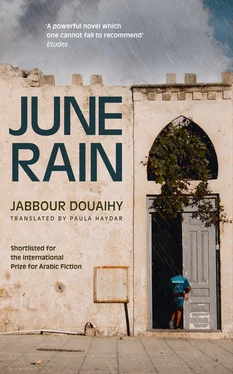‘Look at your brother Shafiq. He doesn’t get caught up in all of that.’
Farid smiled mockingly. No, Shafiq was not someone Farid wanted to emulate.
Master Boulos did not have any illusions concerning the future of the tailoring profession. It was not going to provide for any future generation after his own. What had happened to the shoemakers would happen to the tailors, too. The shoemakers went and destroyed the contents of the new ready-made shoe shop that opened on the main street of the town and the police escorted them to jail. But what good did that do? The shoemakers showed some bravado, but the tailors were much more cowardly. Master Boulos knew every single one of them. It was a difficult profession and Farid was not good enough at it.
‘They say Australia is really nice,’ Master Boulos added.
Many of Farid’s generation emigrated. Some of them suffered a lot. They went alone, putting their faith in God, without a single relative there to greet them. Some of them slept under the open skies during the first days, on church benches or in public parks. As for Farid, his trip would be guaranteed from A to Z. The program was all set:
He would leave Lebanon at the beginning of summer, or in October, as he wished.
He would board the ship in Beirut. A long journey, but enjoyable.
His uncle would send him travel expenses. He would pay the money back at his leisure once he was there, after he started working and getting paid. In Australia, people were paid weekly.
He had work waiting for him in the factory. There was demand for workers in Sydney.
He could go into tailoring if he wished, but they told him that over there it was considered a woman’s job, in general. Or into shoemaking if he wished, and when he was able to save up some money, he could open up a laundry or small grocery store of his own.
They had sent him a picture of all of them together, and a picture of their house with the white wooden railing, and also a picture of a kangaroo carrying its baby in its pouch. We live on the beach , they wrote him, in the Coogee suburb in Sydney. Sometimes the waves reach the front steps of our house. In the summer we sit under umbrellas sometimes while the waves splash over our feet.
They asked him to bring them a souvenir: a small stone from their house in the town.
The last letter he received contained a picture of his cousin. She had a wide face and a full figure; she was smiling. She looked like his mother.
She’s waiting for you , they wrote on the back of the picture.
He imagined her waiting for him, sitting on a rocking chair while the waves splashed over her feet.
They sent him the money from Australia, without waiting for an answer from him. They tried to encourage him that way.
His aunt bored everyone there, constantly showing his picture with his American hat tipped to the side and going on about how handsome he was.
‘I don’t like travelling by sea. Who would trust his soul to the waters?’ Farid said, after he had finished marking the pattern into the cloth with pins.
He was lying, and Master Boulos knew he was lying.
The hours were long, and tailoring work was slow. The only way to entertain oneself was with talk. Talk about girls and marriage, this time around.
‘Either travel or look for a nice girl…’
Nice girl? No. Farid was not good at that. Love required an eloquent tongue, and he was not good at talking.
Khawkh al-dibb , the Bear Plum. That was Farid Badwi al-Semaani. That was what he was called by people at the coffee shop. No one was spared their barbs. The sharp-tongued men goaded him, but they feared what he might do.
A bear plum looks appetising, light green with a tinge of pink, but no one would dare bite into one, because they’re far too bitter to eat.
‘Here comes Bear Plum!’ Sometimes they would say it loud enough for him to hear, when they spotted him coming out of one of the narrow streets leading to the coffee shop. ‘Welcome, Bear Plum,’ they would say and he would sit down with them, smiling without malice, so he could silently watch them play cards. They all played cards. They would lose and get angry, or win. Farid, however, remained a spectator. Someone said he didn’t know the rules of the game and just watched anyway. But he only acted as if he didn’t know how to play, so that he would be able to leave after a few minutes and go back to the tailor’s shop. Master Boulos accused him of always looking down at his shoes, then claiming he didn’t like the way they shined, an excuse to put his tailoring aside and go to the café. There he would whistle for the shoeshine boy who would follow him inside and start shining his shoes. Farid would demand that he use ample polish and brush well, especially at the heels.
Tailoring was a difficult art for him. All that concentrating tired him out. He would mark the material with tailor’s chalk, and put a stitch with needle and thread at the crease of the trousers’ hem. He used tricks, like making the buttonholes with extra fine thread. He had thick fingers that didn’t obey him. If he needed to thread a needle, he would try for a long time, and then call someone to thread it for him. Frustrated, he would go to the café while Master Boulos pretended not to notice.
Moving from one profession to another in the span of a single generation was not an easy thing for Farid to accomplish. First there had been the mules, with all the prodding and loading them up with heavy bundles, and lighting a fire under their tails if they lay down, or hitting them until their legs started to bleed, or even biting their ears as his uncle used to do, to force them to stand up. From there he went to sumac-coloured stone, and then to fine English wool, in one fell swoop.
Bear Plum didn’t care what people said.
He could take a joke, but he never lowered his eyes from anyone’s. Just looking at him seemed to him an attempt to intimidate him. He was easy-going but unemotional.
They tested him at Umm Raymond’s Restaurant. They were sitting at the next table drinking arak and eating: Saeed Ibrahim and Antonios al-Khoury. He and Saeed eyed each other. Saeed Ibrahim was dangerous. You couldn’t take him lightly. They stared at each other. Not the slightest blink. The dare dragged on. Farid would not look away. Impossible. The other customers left one at a time. No one wanted to die by mistake.
The President of the Republic was trying to renew his term. That was what was rumoured, even though he hadn’t announced his intentions yet. The tailor’s apprentice Farid al-Semaani supported the renewal, along with his whole family, including the zaeem . He’d heard the itinerant newspaper seller shouting out the day’s headlines as he walked through the alleys, and that was enough for Farid. He never bought the newspaper, because he could read only with difficulty.
The president’s opponents were losing in the regional elections one after the other. Cheating, pressure, and bribes — that’s what they said.
The North District still remained. Elections would take place in two weeks.
Farid was going to send the money back to his aunt with the first person travelling to Sydney. No. He didn’t beg anyone for money. He was satisfied with his situation. He would return the money because he was staying. Farid Badwi al-Semaani, twenty-four years old, mother’s name Susaan Wardeh, 182 centimetres tall, distinguishing marks: wart on left cheek. He was staying so he could sit in the evenings in a small restaurant owned by a woman in her fifties who still had traces of her beauty left. He would sit with a friend of his or a cousin before two skewers of grilled goat’s meat and a plate of hummus . They would clink their glasses before the first sip of arak mixed with water. They grimaced as they drank, each gulp of the 100-proof arak like bitter punishment. Farid didn’t eat and didn’t talk, and if he did eat after repeated invitation from his companion, it would be very little. A bite or two and that was it. At dinner, instead of eating he smoked many Lucky Strike cigarettes. By the third glass of arak , his face turned bright red, and he would withdraw deeper and deeper into himself. He would listen to his friend and not talk. Perhaps he was trying hard to listen to some buried voice inside himself that was saying obscure things to him. Beset by a strange feeling, he would raise his glass again and sail off into the distance.
Читать дальше












